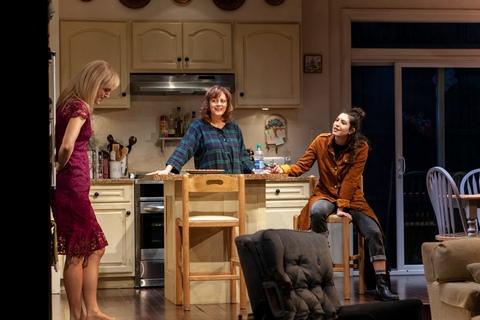Happy Talk
Susan Sarandon stars as a domineering Jewish NJ matron playing “South Pacific”’s Bloody Mary in a community theater in Jesse Eisenberg’s muddled family drama.

Marin Ireland and Susan Sarandon in a scene from Jesse Eisenberg’s “Happy Talk” at The New Group (Photo credit: Monique Carboni)
[avatar user=”Darryl Reilly” size=”96″ align=”left” ] Darryl Reilly, Critic[/avatar]
Abrasive as a subpar episode of Maude and reaching a sour psychological thriller-style finale out of Craig’s Wife, Happy Talk is playwright Jesse Eisenberg’s muddled family drama. It’s the 1990’s and the New Jersey Jewish matron Lorraine is playing Blood Mary in a community theater production of South Pacific and so in addition to the jokey title we get a barrage of painfully cute musical comedy references. Scene transitions are accompanied by blaring snippets of Mitzi Gaynor who played Nellie Forbush and Muriel Smith who sang Bloody Mary in the film version. The combination of Mr. Eisenberg’s smug sensibility, inane contrivances, shtick-ridden dialogue, condescended-to characters, and slack construction all make it a tiresome one hour and 45 minutes.
From off-stage in the time-honored tradition of pivotal characters who never appear, the elderly and ailing Ruthie periodically buzzes for assistance. That is provided by her caregiver, the indomitably upbeat and good-natured thick-accented 40-year-old Serbian immigrant Ljuba, who is saving money to pay for a Green Card marriage. Ruthie’s 65-year-old son-in-law Bill is suffering from multiple sclerosis and mostly sits reading Civil War chronicles or grousing.
Lorraine grandly enters, back from a rehearsal at the Jewish Community Center. Over the next hour, we learn of this 60-year-old’s strained marriage to Bill, her complex feelings for her mother, her reverence for acting and how close she is to Ljuba. Lorraine’s estranged politically radical 30-year-old daughter Jennifer sneaks into the house in the middle of the night to say farewell to Ruthie. Jennifer is moving to Costa Rica as her boyfriend Zev’s parents are bankrolling the couple’s fresh start.

Daniel Oreskes, Nico Santos, Susan Sarandon and Marin Ireland in a scene from Jesse Eisenberg’s “Happy Talk” at The New Group (Photo credit: Monique Carboni)
I go by Darby because you gave me a shit name that’s stuck in your antiquated binary bubble.
Well, I don’t know anything about all that but, you’re right, Jennifer is a dumb name. We were running out of time at the hospital and couldn’t agree on anything.
Darby, as Jennifer now defiantly calls herself, is caught before she can escape. Fiery mother and daughter tirades erupt with Bill interjecting and then giving up as Lorraine furiously throws Darby out. We’ve also met Lorraine’s very out gay Asian-American cast mate Ronny who has been long partnered but being underemployed agrees to marry Ljuba for $15,000.
Happy Talk’s upper middle-class angst scenario begins as an attempt at dark comedy and devolves into creepy psychodrama. Lorraine is actually more The Bad Seed than Auntie Mame. Whatever reality or dramatic potential the play may have had is crushed by Eisenberg’s synthetic stylization. Nothing is really believable or compelling and so what is intended as a shattering denouement makes little impact other than the relief that the play is over. Eisenberg is the acclaimed screen and stage actor and has had several of his plays produced at not-for-profit New York theaters. As demonstrated by this work, his worldview is flippant, and his dramaturgical skills are negligible.

Marin Ireland, Susan Sarandon and Tedra Millan in a scene from Jesse Eisenberg’s “Happy Talk” at The New Group (Photo credit: Monique Carboni)
The domineering and stage struck quipster role of Lorraine would have been tailor made for Linda Lavin or Judith Light. Here, we get Susan Sarandon whose magnetism has been showcased in many films over five decades. Ms. Sarandon is quite credible but lacking in the innate cadences needed to effortlessly land the multitude of witty retorts and barbs. Sarandon is onstage for virtually the entire play, giving a spirited performance that is as faithful as possible to Eisenberg’s pop psychology conception.
Channeling Gilda Radner’s Roseanne Roseannadanna is Marin Ireland with her unrelenting loopy characterization of Ljuba. Ms. Ireland achieves much laughter and pathos. Daniel Oreskes’ Bill is a haunting profile of suffering with his simulations of muscular spasms and forlorn vocal delivery. Mr. Oreskes makes much of this bleak role with his rich talents. Reveling in Ronny’s flamboyance is the delightful Nico Santos. Tedra Millan is suitably and perfectly obnoxious as Jennifer.
Director Scott Elliott’s staging proficiently gets the play from its start to its finish with a modicum of flair. Scenic designer Derek McLane’s lived-in kitchen and living room set is authentically detailed. Jeff Croiter’s crisp lighting design and sound designers Rob Milburn and Michael Bodeen’s clear rendering of music and effects add presentational polish. Clint Ramos’ nifty costume design includes showy flowing floral and print ensembles for Lorraine and down-to-earth attire for the rest of the characters.
Despite the talent and craft on display, Happy Talk is a joyless, hollow and minor exercise.
Happy Talk (through June 16, 2019)
The New Group
The Alice Griffin Jewel Box Theatre at The Pershing Square Signature Center,
480 West 42nd Street, in Manhattan
For tickets, call 212-279-4200 or visit http://www.thenewgroup.org
Running time: one hour and 45 minutes with no intermission






Leave a comment